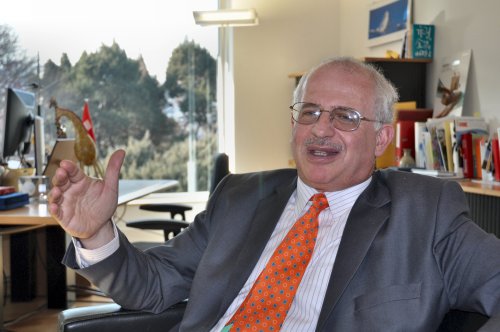Later this week, the world’s leaders will converge in Switzerland for the World Economic Forum to discuss matters of grave importance.
“The World Economic Forum of Davos, which celebrates its 41st year, has become the meeting place for business leaders and political leaders; this I think is the big specialty for the meeting in Davos,” said Swiss Ambassador Thomas Kupfer.
According to global experts, the leading challenges facing the world over the next 12-18 months are global power shifts, the uncertain economic recovery, population growth, inequality and resource shortages.
At the Davos meetings from Jan. 26-30, over 2,500 leaders from over 100 countries representing business, government, civil society, academia and culture will deal with these topics plus many more such as climate change and how to move the Doha talks to the next level.
“All these questions are interlinked with the major regions of the world,” said Kupfer.” It’s not only a question for industrialized countries to tackle these issues.”
 |
Swiss Ambassador Thomas Kupfer (Yoav Cerralbo/The Korea Herald) |
Late last week, the WEF presented a program under the theme “Shared Norms for the New Reality” with the major focus on how to deal with global risks, develop risk mitigation strategies and capture related opportunities.
With the world economy navigating uncharted waters in the wake of the global financial crisis, the Forum will examine goals of building and sustaining economic growth and spearheading efforts to rethink infrastructure development, reshape responsible capitalism and encourage the free movement of people and goods.
“So what I think is good in Davos is that it’s done with a futuristic approach,” he said. “All the discussion of climate change, sustainable development, linking it to business has been a big topic in Davos, especially among the aspects of politics linked to business.”
Social development is also an important issue the ambassador highlighted.
The WEF believes that economic progress without social development is not sustainable, while social development without economic progress is not feasible.
While the WEF is an independent international organization, the Swiss government does have a hand in hosting and offering logistics and security services for participants of the five-day forum.
Kupfer explained that the Davos institution is first a forum for debate with the goal of searching for answers on some of the most challenging issues today.
What makes it more special than other big summits is that it offers a platform for leaders in every sphere to mix and mingle.
“It’s not only big politics and big money that’s there, but also the voices of the underprivileged and the poor people which are often indirectly represented there,” he said.
It is also a place where leaders can discuss issues in a more relaxed manner made due to Davos’ natural splendor.
This relaxed manner has brought on different ideas for tackling delicate issues.
Whatever the case may be, still, the average person on the streets does look at these meetings as the end-all to global challenges but Kupfer thinks that it is a good perception and one that does not give a black eye to Switzerland’s reputation.
As for environmental sustainability, the Davos forum will look at the issue of food security and the economic crises and how they have both highlighted the need and the potential for developing a sustainable food supply.
Heading this goal is the fact that one in six people, about a billion people, do not have access to adequate nutrition today.
One of the hottest topics that will probably receive a lot of attention is the lingering economic crisis.
Ahead of its high-level annual meeting, the WEF last week released a report saying that the world’s expected economic growth will have to be supported by an extra $100 trillion in credit over the next decade.
The WEF believes that the international monetary and financial system is a priority in the wake of the global financial crisis.
At their meeting, the WEF will focus on alternative investments, the development of financial systems, long-term investing, financial governance, as well as mobile financial services readiness and sustainable lending.
Davos can also be a tool to push forward agendas that have become stagnant such as the Doha talks.
“Sometimes they (WEF) can put a little bit of oil in the machine,” said Kupfer.
After the recent G20 Seoul summit, word had it that many leaders were looking towards a rapid conclusion to the Doha talks.
“It would be time that the Doha talks make a serious progression to an end,” he said.
Kupfer reiterated Switzerland’s position against protectionism.
One way to tackle this issue, Kupfer said, is through bilateral trade agreements that aim to eliminate tariffs.
“The major goal for all of us and particularly Switzerland is to conclude these Doha talks,” said Kupfer. “Only then will global trade liberalization move ahead.”
More than 1,400 business leaders from the Forum’s 1,000 member companies will take part in the meeting. Participants also include over 35 heads of state or government, with 19 of the G20 governments represented at ministerial level or higher.
They are joined by government ministers, central bankers, top officials from international organizations, labor leaders, religious leaders, representatives of civil society, media and leading academics.
By Yoav Cerralbo (
yoav@heraldcorp.com)


![[Herald Interview] 'Korea, don't repeat Hong Kong's mistakes on foreign caregivers'](http://res.heraldm.com/phpwas/restmb_idxmake.php?idx=644&simg=/content/image/2024/11/13/20241113050481_0.jpg)
![[KH Explains] Why Yoon golfing is so controversial](http://res.heraldm.com/phpwas/restmb_idxmake.php?idx=644&simg=/content/image/2024/11/13/20241113050608_0.jpg)




